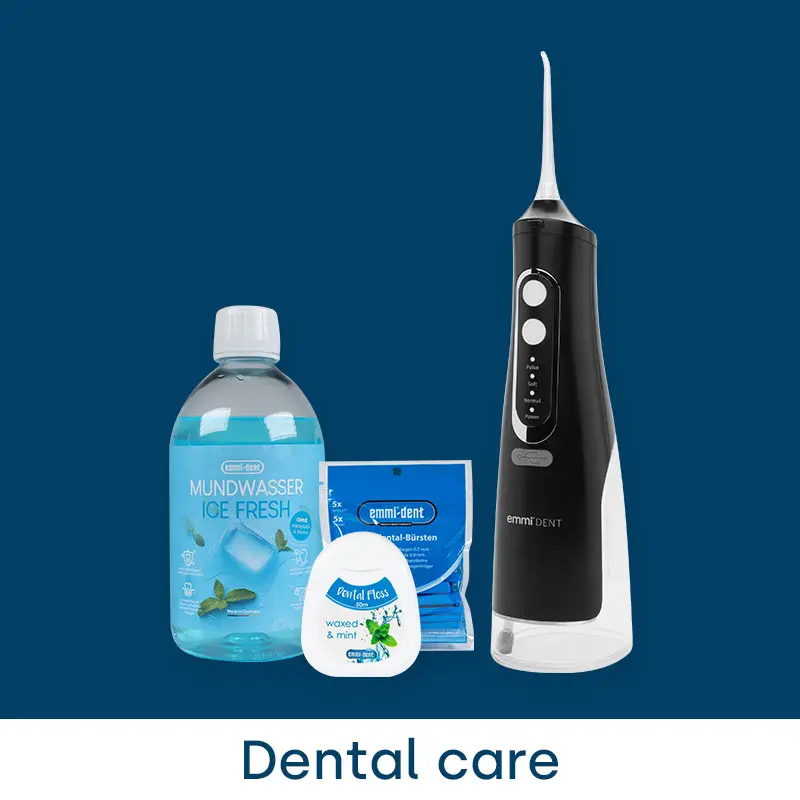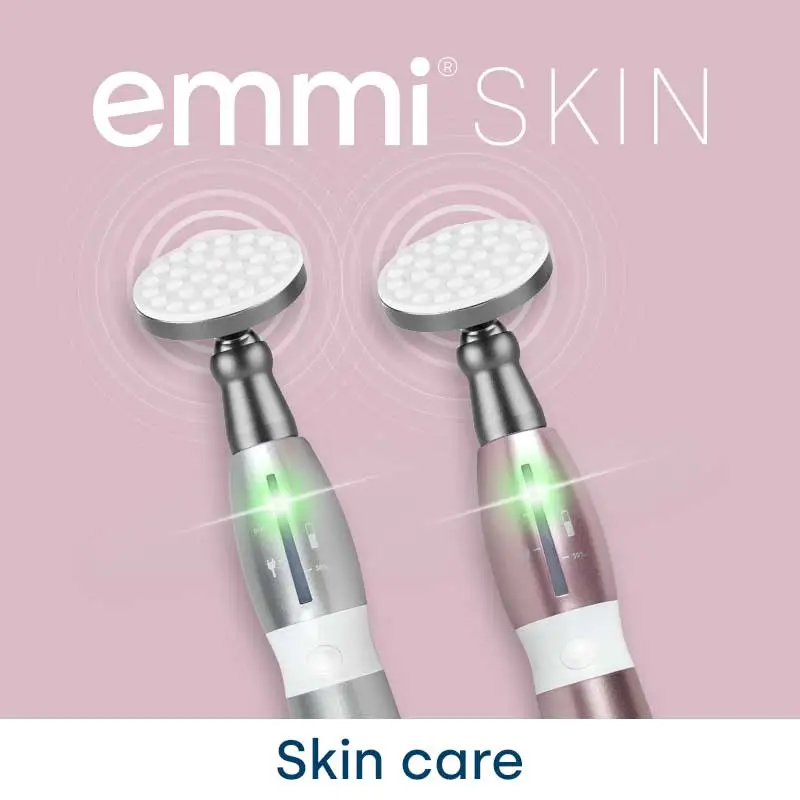Sensitive teeth
Here you will learn what the most common causes of exposed tooth necks and sensitive teeth are, what helps with teeth that are sensitive to pain and what you can do to prevent it.

What causes sensitive teeth?
Sensitive teeth can be a major part of everyday life and are a common problem that affects people worldwide. This type of tooth sensitivity (also known as dentin hypersensitivity) occurs when the enamel erodes or when the gums recede and the underlying tooth necks are exposed. Such changes expose the dentin tubules, small tubes that lead directly to the nerves in the center of the tooth. When these exposed tubules are irritated by heat, cold or spicy food, they can cause pain.

Why do teeth suddenly become so sensitive?
Toothache can have a variety of causes. Often, caries is thought of, but often the trigger is exposed tooth necks, where the dentin is unprotected. Normally, the enamel protects the dentin, and the gums surround it. The dentin contains numerous tiny channels that transmit stimuli to the inside of the tooth. If the enamel is damaged or the gums have receded, these channels are exposed. Hot or cold food and drinks, as well as sour or sweet foods, can then cause severe pain, as the stimuli are transmitted directly to the tooth nerves.

Causes of sensitive teeth
Sensitive teeth can have a number of different causes, which can be divided into four main categories:
Erosions: Loss of tooth enamel due to chemical processes, usually caused by acids in food that dissolve the minerals in the tooth.
Abrasions: Mechanical wear of the enamel, often caused by intensive tooth brushing or the use of the wrong toothpaste, which exposes the dentine.
Recessions: Non-inflammatory gum recession that exposes the tooth necks and dentine.
Recessions: This term describes (non-inflammatory) gum recession. If the gingiva recedes, the tooth neck and thus also the dentine are exposed.
Gum disease: Inflammatory diseases such as gingivitis and periodontitis also lead to gum recession and exposed tooth necks.
Acidic foods and drinks
lovers of sodas, fruit juices and energy drinks should be careful, as these acidic drinks permanently demineralize tooth enamel, making it thinner and more porous. Microscopic cracks develop, causing the enamel to protect the dentin and nerves less effectively against thermal or chemical stimuli.
These erosions are caused by non-bacterial acids, unlike caries. Gastric acid can also dissolve hydroxyapatite crystallites from the enamel, which can occur with reflux, frequent vomiting during pregnancy or bulimia and can cause sensitive teeth.
Poor oral hygiene
Various bacteria exist in the mouth that are necessary for a healthy oral flora. However, an unbalanced diet can cause harmful bacteria to dominate in the biofilm, leading to gum inflammation. A bacterial film settles in particular in the interdental spaces and at the gum line, which can cause gingivitis if teeth are not brushed regularly. This often leads to gum recession.
Patients with teeth or gums that are sensitive to pain tend to neglect brushing their teeth, which promotes plaque formation and the development of tartar, which can only be removed by a dentist. If left untreated, this can lead to aggravated gum inflammation and ultimately to periodontitis. Periodontitis affects the entire periodontium, including the bone, and requires lifelong treatment. Patients with periodontitis often have sensitive tooth necks.
Incorrect toothbrushing technique
Tooth enamel and gums can also be damaged by excessive dental care. Pressing the toothbrush too hard, especially with hard bristles, or brushing immediately after consuming acidic foods can do more harm than good. Incorrect brushing technique can abrade enamel and injure gums, leading to exposed tooth necks and sensitive teeth. Bleeding gums during daily care can be a sign of gum inflammation or incorrect technique and should be examined by a dentist. Ultrasonic toothbrushes therefore offer a very good alternative to conventional toothbrushes, as they use ultrasonic technology to clean without scrubbing.
Teeth grinding
Mechanical pressure can also cause teeth to be sensitive to pain, especially as a result of teeth grinding. When teeth grind, they rub against each other permanently, causing tooth damage and exposing dentin, which is sensitive to pain. Many people grind their teeth unconsciously or at night. This phenomenon, known as bruxism, is diagnosed by a dentist. The pressure when teeth grind is often much higher and longer lasting than when chewing, causing long-term damage to the enamel.
Bleaching and teeth whitening
Teeth whitening methods are now not only performed by dentists, but also at home. Hydrogen peroxide is often used in bleaching, which removes colorants and liquid from the tooth, temporarily leading to “dry” enamel and irritated gums. Contact with saliva can cause pain, which subsides after a few days. Patients with sensitive teeth should definitely consult their dentist before such treatments, as the sensitivity to pain may otherwise increase.

What helps against sensitive teeth?
The treatment of teeth that are sensitive to pain aims to alleviate the causes of the sensitivity. To effectively treat the discomfort and prevent future problems, different approaches should be considered depending on the sensitivity and individual circumstances:
The right toothpaste for sensitive teeth: Toothpastes specially formulated for sensitive teeth often contain ingredients such as potassium nitrate or strontium chloride, which help block the transmission of pain from the tooth surface to the nerve. These toothpastes form a protective barrier over the exposed dentinal tubules, thus reducing sensitivity. Our Nature Toothpaste is suitable for sensitive teeth and not only relieves pain but also provides long-lasting protection.
Fluoride treatments: Applications of fluoride can strengthen and remineralize tooth enamel, improving protection against external stimuli. Many dentists recommend fluoride gel applications or the application of fluoride varnishes to harden the tooth surface and effectively reduce sensitivity. These measures are particularly important when teeth are affected by acid exposure.
Suitable toothbrush with a gentle brushing technique: Use of an ultrasonic toothbrush and a gentle brushing technique are crucial to avoid further abrasion of the enamel and to avoid irritating the gums. It is important to avoid aggressive scrubbing, as this can damage the gums and increase sensitivity. Instead, you should brush with light, circular movements to clean your teeth effectively while protecting them. With ultrasonic toothbrushes, there is no need to scrub at all, and the toothbrush only needs to be held against the tooth.
Avoid acidic foods: acids in food and drinks can weaken tooth enamel and increase sensitivity. It is advisable to minimize the consumption of acidic foods and drinks and to rinse your mouth with water after consuming them to neutralize the acid residues and thus protect the tooth enamel.
Nightguards for teeth grinding: If teeth grinding (bruxism) is the cause of your sensitivity, a dentist-fitted nightguard can be worn at night. This protects the teeth from further wear caused by grinding and can thus help to reduce sensitivity.
Regular professional teeth cleanings: Professional teeth cleanings are essential to remove plaque and tartar that can accumulate despite good home care. These cleanings, which should be done at least twice a year at a dentist appointment, not only reduce the risk of cavities and periodontal disease, but are also crucial to keeping gums healthy and minimizing gum recession. Such measures protect against the most common causes of tooth sensitivity and improve overall oral hygiene.
Balanced nutrition: A balanced diet rich in calcium, phosphate and vitamins strengthens teeth from the inside out. It is also important to avoid excessive consumption of acidic foods and beverages, which can erode tooth enamel. Instead, a diet that is healthy for teeth should be chosen, one that protects the enamel and makes the teeth less susceptible to sensitivity.








